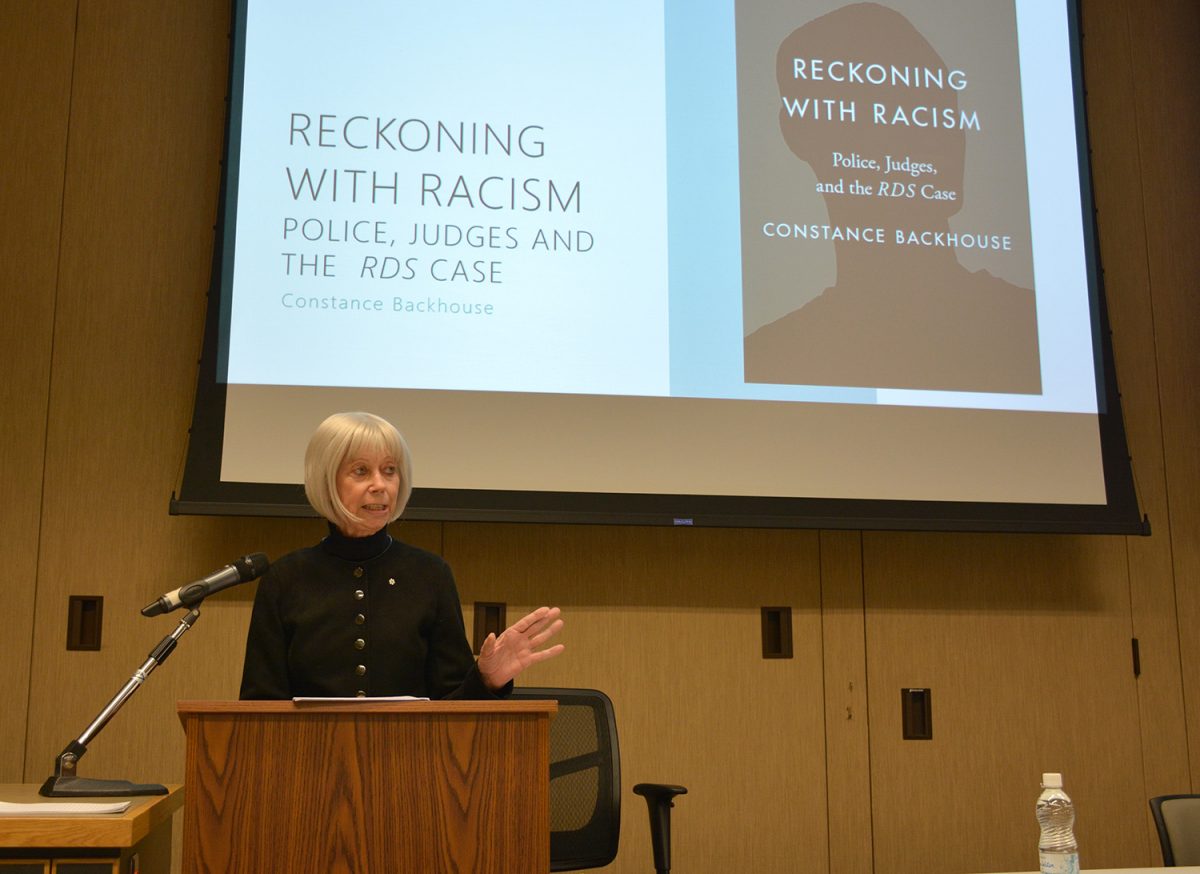
University of Ottawa Professor Constance Backhouse was the guest speaker at the 14th Annual DeLloyd J. Guth Visiting Lecture in Legal History.
“Rock Star” of Law Professors delivers 14th Annual Guth Lecture
Constance Backhouse: Reckoning with Racism in the RDS case
Retired Faculty of Law Professor DeLloyd J. Guth, who now lives in Ann Arbor, Michigan said he was “envious” of students and his former colleagues on a cold, snowy October Thursday in Winnipeg, because they got to hear Professor Constant Backhouse in-person at the 14th Annual DeLloyd J. Guth Visiting Lecture in Legal History. Guth delivered his welcoming remarks by proxy through Associate Professor Amar Khoday.
Khoday reminded the audience that Guth had started the lecture series in 2010, starting with Supreme Court of Canada Chief Justice, the Right Honourable Beverley McLachlin, P.C. (as she then was). Since then, many illustrious academics have spoken on intriguing, surprising and important aspects of legal history. A number of recordings of past Guth Lectures can be found on the Faculty of Law Youtube Channel, including McLachlin’s. In the question and answer session that followed, an audience member recalled first hearing of Backhouse referred to as a “rock star” of law professors, and firmly agreed to that description.
Professor Backhouse holds the position of Distinguished University Professor at the University of Ottawa’s Faculty of Law, teaching in the areas of legal history, human rights, critical race studies, and feminist issues in law. She has published a number of award-winning books, with her most recent forthcoming book being about the RDS case (1997), in which the Supreme Court of Canada struggled with a claim of racial bias against Canada’s first Black female judge. Backhouse’s lecture was an overview of her forthcoming book.
In brief, a 15-year-old Black teenager was accused of assaulting a Caucasian police officer who then arrested him. The case was tried in front of the first Black female judge appointed in Canada. The teenager’s and the police officer’s respective testimonies were very different, and the judge acquitted the teenager. Remarks she made in the oral decision “affronted” both the police officer and the crown prosecutor, who both lodged complaints against the judge. A Caucasian reporter wrote an editorial column that turned the focus of the case from a police officer overreacting to Black teenagers, to a case accusing a Black judge of racism.
Backhouse’s research was intensive and personal, going to the people and contexts behind the case.
Backhouse’s research was intensive and personal, going to the people and contexts behind the case. She interviewed every person connected to the case still living, including the accused 15-year-old who is now aged 39, has completed a university degree and become a leader in the Black community after overcoming challenging life circumstances. His defence lawyer, Rocky Jones, has since died, but left a legacy of influencing many Black youth to become lawyers. Backhouse interviewed Jones’ wife, the police officer, the crown prosecutor, and the journalist who wrote the incendiary editorial, as well as Corrine Sparks, the presiding judge, whose career was all but ruined because of this case.
Backhouse emphasised that most Canadians are not aware of the deep racism against Black people that exists in Canada and pointed out how many prominent historical Canadians were slaveowners to the extent that by the end of the late 18th Century, Nova Scotia was home to the largest free Black population outside of Africa. Nova Scotia carries a reputation for being racist even today, and in the 1990s when the RDS case took place, tensions were high.
“There is room for resistors,” Backhouse said. “There is room for change.”
The RDS case was about racialized policing but the narrative shifted towards portraying a Black judge as biased towards white officers and an opportunity to mark a progressive shift in Canadian jurisprudence was missed. “Is the concept of objectivity real or illusory,” Backhouse asked. “Criminal law is mired in class, race and sexism,” she concluded, adding that in order for progress to be made in criminal law, it will be necessary to reduce the interface between the racist system and the people. “There is room for resistors,” Backhouse said. “There is room for change.”






